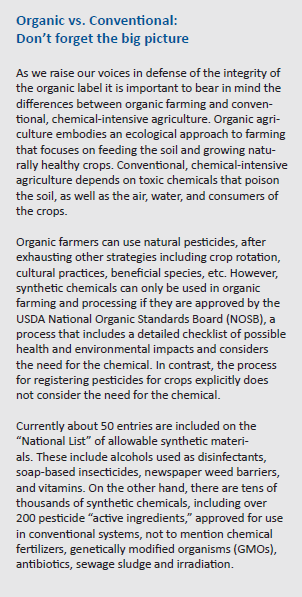Keeping Organic Strong: Changes in organic regulations and farming practice
National Organic Standards Board Fall 2022 Meeting
View issues that are before the board at the Fall 2022 meeting!
The NOSB Fall Meeting 2022 will be held in-person Tuesday October 26th through Thursday October 27th, 2022 in Sacramento CA. The meeting information for remote access will be posted in early October and can be found here.
A draft meeting agenda is available here. And a detailed agenda, along with the proposals, are available here.
Written comments are due by 11:59pm ET September 29th, 2022, as well as registration for Oral Comments. (Oral Comment sign-ups fill up fast) Sign up for Oral Comments here.
Meeting dates are:
- Public Comment Webinar Day 1: Tuesday, October 18: from Noon - 5:00 pm Eastern
- Public Comment Webinar Day 2: Thursday, October 20: from Noon - 5:00 pm Eastern
- NOSB Public Meeting Day 1: Tuesday, October 25: from 9:00 am - 5:00 pm Pacific
- NOSB Public Meeting Day 2: Wednesday, October 26: from 9:00 am - 5:00 pm Pacific
- NOSB Public Meeting Day 3: Thursday, October 27: from 9:00 am - 5:00 pm Pacific
Where? The NOSB Fall Meeting 2022 will be held in-person in Sacramento CA. The meeting access information links will be posted in early October and can be found here.
View issues that are before the board at the Fall 2022 meeting!
Public Comment
The National Organic Standards Board (NOSB) invites the public to submit written comments and/or provide oral comments on the October 2022 meeting issues.
Written Comments
Written comments can be submitted now via regulations.gov. The deadline to submit written comments is September 29th, 2022 at 11:59 pm EDT
Oral Comments
Oral comment registration is now open.
The Board will hear oral comments during the following times via zoom:
- Webinars: Tuesday, October 18th and Thursday October 20th, 2022 from Noon - 5:00 pm EDT
Links to listen in to the virtual comment webinars and the public meeting will be posted on this webpage in early October.
Questions? Email Michelle Arsenault, NOSB Advisory Committee Specialist or call 202-997-0115
About the Board
The 15-member board, consisting of four farmers, three environmentalists, three consumers, two food processors, and one retailer, scientist and certifying agent, votes to allow or prohibit substances and practices in certified organic food and farming. The NOSB acts as a life-line from government to the organic community as it considers input from you, the public - the concerned citizens upon whom organic integrity depends. That is why your participation is vital to the development of organic standards. Rest assured, if you submit a public comment either in person or online, your concerns will be considered by the Board. Remember that the NOSB can't take serious action to protect organic integrity without your input!
A Framework to Keep in Mind When Commenting to the NOSB:
According to the Organic Foods Production Act, a synthetic substance may only be allowed for use in organic production if it meets the following criteria [7 USC 6517(c)(1)(B)]:
-
It contains an active synthetic ingredient in the following categories: copper and sulfur compounds; toxins derived from bacteria; pheromones, soaps, horticultural oils, fish emulsions, treated seed, vitamins and minerals; livestock parasiticides and medicines and production aids including netting, tree wraps and seals, insect traps, sticky barriers, row covers, and equipment cleansers.
-
It contains synthetic inert ingredients that are not classified by the Administrator of the Environmental Protection Agency as inerts of toxicological concern.
Additionally, it must be fully established that the use of the substance [7 USC 6517(c)(1)(A)]
- would not be harmful to human health or the environment;
- is necessary to the production or handling of the final product because natural substitutes are not available; and
- is consistent with organic farming and handling (see the NOSB’s Principles of Organic Production and Handling).
Structuring your comments on synthetic substances around these points and referencing the specific stipulations in the law will help the members of the NOSB to understand your argument and will make your input more effective.
View issues that are before the Board at the Spring 2022 meeting!
Also see our NOSB archives pages to read about current and past opportunities for public involvement in the development of organic standards.

The organic regulatory process provides numerous opportunities for the public to weigh in on what is allowable in organic production. USDA maintains a National List, set by the NOSB, of the synthetic substances that may be used and the non-synthetic substances that may not be used in organic production and handling. OFPA and NOP regulations provide for the sunsetting of listed substances every five years and relies on public comment in evaluating their continuing uses. Sunset review, the process of reviewing substances on the National List every five years, is mandated by the Organic Foods Production Act. No substances are up for sunset review at this meeting. To be added to the list of allowed synthetics, it must be shown that the use of such substances – (i) would not be harmful to human health or the environment; (ii) is necessary to the production or handling of the agricultural product because of the unavailability of wholly natural substitute products; and, (iii) is consistent with organic farming and handling. The public may also file a petition to amend the National List, either by removing a material currently on the list or by adding a new one. In both cases, sunset and petition, the NOSB is authorized by OFPA to determine a substance’s status.
For more information on the history of organic agriculture and why it is the best choice for your health and the environment, please see Beyond Pesticides’ Organic Food Program Page.









